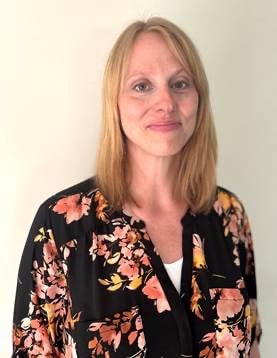Liz Whynott will join RIZE Massachusetts Foundation as its new Senior Program Officer.
Photo credit: RIZE Massachusetts
NORTHAMPTON — RIZE Massachusetts Foundation has announced that Northampton resident Liz Whynott will take a new leadership role with the foundation that is solely dedicated to funding and collaborating on solutions to end the overdose crisis in Massachusetts.
Whynott is joining the organization as senior program officer and will lead the development and implementation of a new hub-and-spoke model for the state’s municipal training and technical assistance program, which RIZE will assume control of on July 1 through its Mosaic Opioid Recovery Partnership. The program is funded by settlement dollars.
“Liz brings deep experience, compassion and a fierce commitment to the people and communities most deeply impacted by the opioid crisis,” said Julie Burns, president and CEO of RIZE. “She has spent her career building trust and creating programs that meet people where they are, and listening to the perspectives of people with lived and living experience. Under her leadership, municipalities can expect thoughtful, personalized support that helps communities turn opioid settlement funding into real change on the ground.”
Whynott told Reminder Publishing she was excited to learn of and now receive opportunity to work in this role with RIZE.
“I’ve just been lucky in my career because I was able to be a part of a lot of projects working with different municipalities all over Western Mass. in implementing harm reduction programs that are community based and focused,” Whynott said. “I deeply believe in the need to treat people who use drugs with respect and be provided evidence-based services that hold up people’s dignity. I think that’s what a lot of my career has been based on.”
Whynott, a Northampton resident, joins RIZE after more than 15 years at Tapestry Health in Western Mass., where she led efforts to expand harm reduction services across the region. Most recently, she served as director of harm reduction, managing teams, programs and policy initiatives designed to reduce overdoses and increase health equity.
Whynott has a master of public health degree from the University of Massachusetts Amherst and a bachelor’s degree from Suffolk University.
“When I started at Tapestry, there was one syringe access program and now there are harm reduction programs in about 12 different communities so I was a big part of that expansion and something I loved so much,” said Whynott. “When this opportunity arose, I did feel like it was kind of a natural next step. I feel like I’ll be able to take everything I’ve learned at Tapestry and apply it in this bigger way on the state level, but in a way that will still be focused on supporting municipalities and to spend the opioid settlement money.”
The transition of oversight of TTA to RIZE is designed to streamline services, deepen community connections and align training and technical assistance more closely with the state’s broader opioid abatement grantmaking strategy. RIZE’s current role in administering the community grantmaking program, including the Municipal Matching Grant program, will permit a more efficient and coordinated approach.
Through the new role, Whynott will guide the TTA to help municipalities effectively utilize opioid abatement funds. The new model she is spearheading will embed regional coordinators across the state, ensuring municipalities have a trusted, local partner to support the development of strategies and solutions, rooted in their communities to end the opioid crisis.
“I think the RIZE approach is to tailor the support and technical assistance to communities and to regions that take into account their specific needs while also providing support in ways that can help municipalities across the state to connect based on where they’re at in spending, or what topics of interest are in terms of where funding is going,” Whynott said.
Mosaic is a unique, public-private collaboration designed to support initiatives that are addressing the opioid overdose crisis in communities that have been historically underserved and have experienced a high rate of opioid-related overdose deaths. It is funded by the Massachusetts Department of Public Health, Bureau of Substance Addiction Services, and powered by RIZE.
Funding comes from the MA Opioid Recovery and Remediation Fund, which resulted from the historic legal effort to hold private companies accountable for the harms caused by the opioid overdose crisis.
“I just feel really lucky to have this role because I really do want to support communities and helping them to get this money into the hands of people in communities that have felt the most devastation from this epidemic,” said Whynott. “While things have changed, I think there is still — and will continue to be — the need to really work with the community to understand and remember why we’re here. Even if the overdose numbers go down, we still need to [be] organized and to keep focusing on what we’re doing so that they’ll continue to go down. Continue to pay attention on emerging trends and what’s going on, and really continue to listen to the people who use drugs and the families and loved ones directly connected to drug use.”
Whynott added she feels like the new role will provide an opportunity to work with communities to find and implement sustainable solutions that can continue on through transitions of city governments. More cohesion and proactiveness around the issue will go a long way, she added.
RIZE Massachusetts Foundation is solely dedicated to funding and collaborating on solutions to end the overdose crisis. Guided by those with lived and living experience and unafraid of new ideas, RIZE is building networks, creating programming, and investing in community partners using novel approaches to preventing overdose and increasing access to treatment and recovery supports. RIZE makes health equity a programmatic priority by addressing root causes such as racism, systemic barriers to care and power imbalances. To learn more about its work, visit rizema.org.
“I’ve seen firsthand the power of meeting people in need with compassion, dignity and practical support,” said Whynott. “I’m excited to bring that same philosophy to this next chapter at RIZE and to partner with municipalities and local leaders to make the most of these critical resources.”



